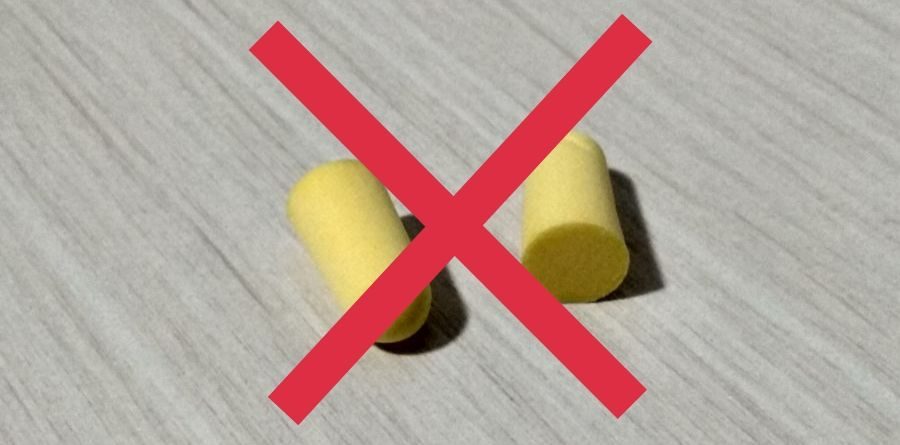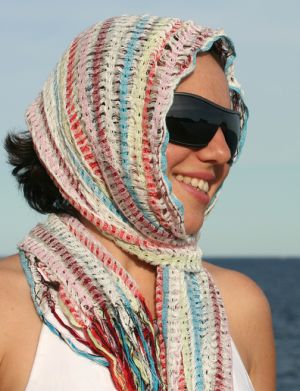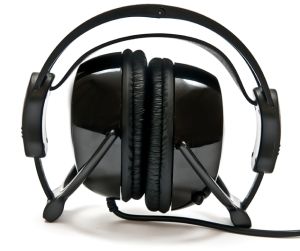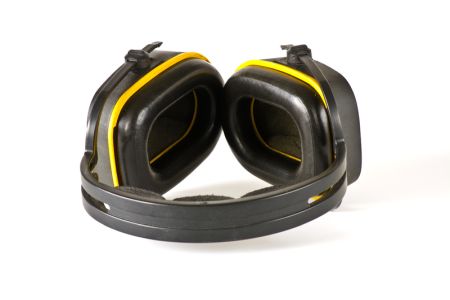
It’s for sure that you want to sleep your night peacefully without any disturbances. Specifically, you don’t want any unwanted noises in your bedroom. But you may feel that earplugs are too uncomfortable or that they even disrupt your sleeping. What other options could you use, especially in case you need to block unwanted noises often or even every night?
Here we have described 19 different earplug alternatives for sleeping:
1. Sound Reducing Sleep Mask (with Muffling function)
Number one alternative for earplugs is definitely a sleeping mask with sound muffling function. The sound muffling sleep mask has a double benefit compared to a typical sleeping mask, which only blocks the light. The sound reducing sleep mask also blocks noises and will much likely help you sleep better over the night.
The muffling function can block noises almost as well as earplugs. In addition, the sound muffling sleep mask is a very comfortable solution; it is very soft and won’t feel too tight on your head. A satin cover can slide smoothly on the pillow. It helps the sleep mask to stay in place.
Probably the best solution for a sleep mask with sound muffling is called Hibermate.
Hibermate’s Noise Reducing Rating is around 15 – 18dB. While “Preformed earplugs, such as the ER-20 earplug are universal (non-custom) earplugs with a noise reduction rating (NRR) of about 12 dB.”
If you are interested in this product, see the current price from here.
2. Headband

Usually, headbands are used simply for style or to keep your hair in shape. However, you can place some headbands over your ears and then isolate noises.
However, there are a lot of different kinds of headbands, and not all of them are as functional to use on your head overnight. Some headbands are quite hard, and if you wear a hard headband during the night, it can cause itching or even pain on your head.
Therefore, it is crucial to choose the right kind of a headband to help block noises, so that it will work properly without being too uncomfortable.
So, which kind of a hairband would be ideal to use overnight?
The ideal headband is soft and comfortable. For instance, a headband made from wool (just like woolen socks) may be a right choice. Woolen headbands are usually self-made, so it might be an ideal DIY project, if you are looking for an excellent alternative solution for earplugs.
The self-made woolen headband might be ideal to use overnight, because it likely won’t be too tight on your head. Also, it is soft, and should feel comfortable in any normal sleeping position.
However, there are some headbands that are mainly designed to block noises while sleeping. For instance, SleepPhones is a headband that you could use while sleeping. With SleepPhones you can listen to any audio you wish, since this product works as headphones.
There are indeed many benefits with SleepPhones:
“Reduce ambient noise, conversations, traffic sounds and even block out snoring!”
3. Custom-made Molded Ear Defender
When you are looking for alternatives to earplugs, you probably think that you don’t want to use traditional disposable earplugs. Therefore, custom-made silicone injected earplugs are something totally different that you might want to try.
For instance, NoiseBreaker is a brand for a custom-made molded ear defender. Once the NoiseBreaker ear defenders have been molded, you can use them as long as they fit in your ear. In other words, more likely for the rest of your life!
According to the NoiseBreaker website, the current price for a pair of ear defenders is £80, which is around $130.
It may sound quite pricy at first. But let’s say that you’d usually wear earplugs every night, and you would change them every night.
How much does it cost to wear traditional earplugs every night?
A pair of traditional earplugs costs around $0.22. If you’d use disposable earplugs each night for one year, the total price would be about $80. So in just under two years, the NoiseBreaker ear defender would be a cheaper choice!
How is the NoiseBreaker made?
“All of our NoiseBreakers can be manufactured in a solid, shell form without the through channel, for maximum noise protection.
After taking a cast of your ear, your NoiseBreakers are then moulded to ensure each one fits perfectly.”
If you are interested, take a look on their website, and see for yourself if it would be the right solution for you.
4. White Noise (Machine)
White noise (or actually also pink, brown, green violet, blue, orange, grey or black noises) can help you fall asleep. The steady sound that covers other disrupting sounds can help you fall asleep.
There are many different solutions for producing white noise. Typically, purposefully designed white noise machines would be the most recommended solution.
However, there are some apps that you can use with your smartphone and let your smartphone generate white noise. Such apps are, for instance,
for free:
White Noise Generator, White Noise Baby, and Baby Sleep.
for a charge:
White Noise Pro: Sleep Sounds & Relax, White Noise and White Noise Pro.
Which one you should select is up to you. But I tested those free ones, and it seems that “Baby Sleep” is the most reliable one. If you want to pay for a white noise app, it may be even reliable and include more functions. But I think you can survive just fine with a free one.
Furthermore, if you are simply looking for different kinds of white noise, you can easily find the sound you want to use in YouTube. And maybe you can play it with your own device.
If you are interested in all kinds of sounds that may help you fall asleep, take a look on what I found out on this post where I listed 66 weird sounds that may actually make you fall asleep instantly.
5. Sleeping Cap (Nightcap)
The traditional sleeping cap is meant for use while sleeping, usually to protect your hair and keep your hair in good shape.
However, since a regular sleeping cap covers your ears, it can reduce at least some noise and may be useful to help you to fall asleep easier.
Some sleeping caps are quite thin, so they likely aren’t as functional for eliminating noises as a thicker cap would be. If you want to make sure that the sleeping cap will block noises, you may want to use a thicker sleeping cap.
On the other hand, a sleeping cap that is too thick might heat your head too much during the night and therefore disrupt your sleeping. So, consider which kind of cap would be best in your case, if any.
Here are two examples of sleeping caps that may be good choices to use during the night and blocking noises same time:
However, remember that sleeping caps are not usually designed to block sounds, so it may not be a sure deal.
6. Shower Cap
Just as using a sleeping cap, using a shower cap to block noises might not seem to be the most effective option. However, a shower cap can indeed block some sounds. If you have any comfortable pads to place inside the shower cap between your ear and the cap, it might block the sounds even better.
Is it comfortable to use a shower cap overnight?
It depends, and that is why you might want to try it out, if you have a shower cap. Some shower caps are thick enough to isolate disrupting sounds, while comfortable enough to use overnight.
Take a look at different options, and consider if you want to use a shower cap for eliminating sounds during the night.
Here is one example of a shower cap that may be ideal to use overnight.
7. Swimming Cap

Swimming cap can similarly help to block noises. Especially, swimming caps that have a “pocket” for ears can reduce noise tremendously.
One thing with a swimming cap is that you should make sure that you really can use it overnight. Swimming caps are meant to be used for a shorter duration of time, because swimming is naturally something that most people don’t do for hours at a time.
For some people, the swimming cap may cause itching or other issues. So before you sleep with a swimming cap, make sure that it is the right solution for you.
Here you can find an example of a swimming cap that may be used during the night.
8. Stocking Cap
Some stocking caps can be used overnight. Therefore, you can use a stocking cap to eliminate sounds, just like a sleeping cap, a shower cap or a swimming cap.
One crucial aspect of stocking caps is related to their thickness. Since a stocking cap is designed for use in cold weather, they may heat your head overnight. Therefore, use a thinner stocking cap if you are going to try to sleep with one.
Here you can find a collection of stocking caps that may block noises and be good choices to use during the night:
9. Skull Cap
A typical cap covers just part of the head area. But if you have a skull cap, it may help reduce noise.
There are indeed a lot of different kinds of skull caps, so you need to consider carefully which type of a skull cap you could use overnight. But if you feel that this kind of cap won’t be useful to use during the night, take a look at other options.
I did some research and found out a cap with earflaps that you could use while sleeping. Take a look at this cap and see if it could be the right one for you.
10. Ear warmers
Ear warmers are usually used in the wintertime (like the name itself tells) to keep your ear area warm. With ear warmers, you can have similar benefits as with other caps, when considering the sound blocking function.
Therefore, if you want to try to use ear warmers overnight to reduce noise, select comfortable and soft ear warmers.
Where could you find an ideal ear warmer to use overnight?
Here are some ear warmers that might be comfortable to use overnight:
11. Scarf

In case you don’t want to use any cap or ear warmers, you may consider using a scarf to reduce noises.
The thinnest scarf may not be enough to reduce noise, but a thicker one – maybe a scarf made from wool – may be an ideal option to help you sleep better.
Simply wrap the scarf around your head so that it covers your ears, but not your face.
If you are looking for an ideal scarf to use overnight, you may want to look at some of these options:
12. Isolation Headphones

Isolation headphones are usually used when working in a noisy environment. With this kind of headphones, you can listen to music or radio, for example.
Similarly, you can simply wear isolation headphones on your head and have a good night’s sleep. One benefit is that you can listen to music or other sounds at the same time.
Therefore, you could fall asleep easier with some relaxing sounds. For instance, you could use the sounds described earlier. If you missed that part, you can find the same link here for the sounds that may help you fall asleep.
With isolation headphones, the ideal sleep position is most likely sleeping on your back or your stomach. It might be hard to sleep on your side, since the headphones are placed over your ears.
However, if you set your pillows so that the cup of the isolation headphones is between two pillows, sleeping on your side may be a bit easier. In any case, this solution works probably best for those who are back or stomach sleepers.
13. Ear Defenders (Ear Muffs)

Similarly to isolation headphones, ear defenders are usually meant to be used while working in an environment with loud noises. However, if you are a back or stomach sleeper, ear defenders may be one solution in your case.
Ear defenders can in some cases block noises much better than earplugs. However, it may be a bit hard to keep them on your head overnight.
It is because the cup of the ear defenders pushes against the area surrounding your ear. If you keep such ear defenders on your head over the night, your ears might feel very uncomfortable.
Furthermore, your ear area might get a bit warm, and this may also cause itching and discomfort.
So consider carefully before you try ear defenders overnight. For instance, you can take naps during the daytime and see if you can sleep with ear defenders comfortably.
14. Noise-Canceling Headphones
If sleeping with isolation headphones or ear defenders feels impossible, you may consider getting noise-canceling headphones. It is true that most noise-canceling headphones have similar issues as isolation headphones or ear defenders.
However, usually, noise-canceling headphones are more comfortable compared to those two previous options.
Many noise-canceling headphones are designed for use in many different kinds of situations, and even for long-time use.
Therefore, this kind of headphones might be an excellent choice to use overnight. In any case, the same thing is true with noise-canceling headphones as with isolation headphones and ear defenders; they all fit best for those who sleep on their back or their stomach.
If you are interested in testing or buying noise-canceling headphones, these might be optimal to use overnight:
15. Soundproofing a Bedroom
To block the noises from outside, you might need to take some steps to soundproof some parts of your apartment.
In particular, when you want to sleep in a silent environment, soundproofing your bedroom may be a wise act.
However, soundproofing your whole bedroom might cost a lot of money, and it often takes a lot of effort. But if you just can’t use earplugs or other alternative solutions described in this post, you may want to take this action.
But how can you soundproof your bedroom?
It might be enough to just soundproof the door and window area of your bedroom.
Installing a door sweep, using a weather stripping and putting some soundproofing material on the door might be a cheap and easy solution for soundproofing the door area.
To soundproof the window area, some rubber weather stripping material can help seal the edges of the window.
Furthermore, a high-quality soundproofing curtain might be an excellent solution to block noises outside.
Another option is to cover the window area with some material that blocks the noises well. For instance, you could use soundproofing foam. Or just cover the window area with styrofoam, which is also probably a much cheaper option.
Take a look at this blog post, where you can find very detailed information about soundproofing a bedroom.
Furthermore, if you want to estimate how much it will cost to soundproof your bedroom, read this blog post that I made about the cost of soundproofing a bedroom. In that blog post, you can find the estimated total cost in three different cases.
16. Change Your Window
It is possible that your window is the weakest place in your bedroom, when it comes to soundproofing. So make sure that your window won’t let too much noise in, maybe just enough to help you sleep well the whole night.
What could you do if you notice that too much noise comes in through your window to your bedroom?
As mentioned earlier, one option is a soundproofing curtain. However, in some cases it might be best to change your bedroom window completely. The ideal window would be a double or triple glass window. Then, it can isolate noises much more effectively.
An extra benefit with a new double or triple window is that it can also keep warm air inside. Especially, if you live in an area where the winter is cold and frosty, a triple glass window could be the perfect solution for both heating and soundproofing aspects.
One option to soundproof the window area is:
17. Soundproofing Curtains
Standard curtains are meant to block light, but they can isolate some noises, too.
However, with specific soundproofing curtains, it is possible to block noises even more effectively.
Whenever you are considering getting soundproofing curtains, you need to select the curtains carefully. It is because such curtains are usually costly, and fitting them to your window area may be quite a scrupulous process.
Therefore, if you consider buying soundproofing curtains, try to find all specific information about them.
More tips related soundproofing curtains you can find here.
18. Use Two Pillows
Use two pillows, so that one pillow is against your left ear and another pillow against your right ear.
This way, you can block at least some noises.
However, it might feel quite difficult to balance two pillows on both sides of your head. For a side sleeper, this might still be a viable option. For instance, if you are sleeping on your left side, you could keep another pillow on your head on the right side, and rest your right hand over the pillow.
This way, you may be able to block some noises.
However, using pillows for blocking unwanted noises might not be as functional as other options, but it may work when you don’t have any other options to use.
19. DIY Cotton “Earplugs”
If you feel uncomfortable with traditional earplugs, you might want to try to do-it-yourself “earplugs.”
All you need to have is some cotton balls.
“Break off a small, dime-sized piece of a cotton ball. Roll the cotton ball piece into a round ball.”
You can try different sizes, so that cotton pieces can fit in your ear in the best way.
“Wrap the cotton ball in a protective plastic wrap.”
Using soft plastic wrap might be the best option, since you can easily wrap the cotton ball in the plastic piece.
“Tie the end of the plastic wrap.” and “take a small rubber band and wind it around the tail of the plastic wrap.“
You can read more specific instructions to make DIY cotton earplugs here.
You may also want to consider:
Reusable Wax earplugs
If you feel that regular earplugs don’t fit your purposes, you might want to try reusable wax as earplugs.
If you haven’t heard about reusable wax earplugs, you can find more information about them here:
Ohropax Reuasble Wax Cotton Plugs
The great benefit with reusable wax earplugs is that you can use them many times.
Sleep in Another Place
What if you feel that any of the tips described above don’t work with you?
In particular, if you know that the noise problem will be temporary, you could consider sleeping in another place during that time.
If your house has many rooms, you might select another, quieter place to sleep.
One option is to book a hotel room for the time when you know that there will be some disrupting noises near your home.

